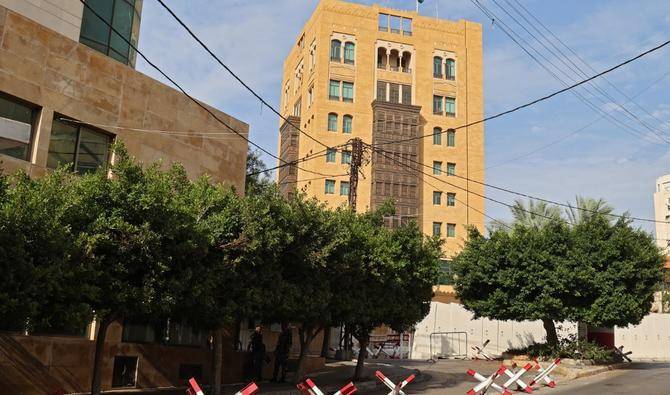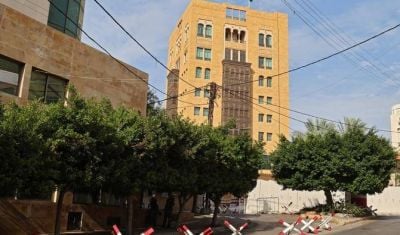
The Saudi Embassy in Beirut. (Anwar Amro/AFP archive)
“Stupidity.” This is how Saudi ambassador to Lebanon Walid Bukhari, writing via Twitter on Thursday, characterized threats against his diplomatic mission by a critic of the kingdom.
The ambassador’s tweet also quoted a verse by pre-Islamic poet Maymun al-Aasha, speaking of an animal that tried to break a stone but only managed to break its own horns.
Bukhari may have been alluding to Ali bin Hashem bin Salman al-Hajji, a Saudi critic wanted by the authorities in Riyadh for “terrorism,” who on Aug. 23 posted an audio recording on social media in which he threatened to carry out an attack against the Saudi embassy in Beirut.
In response, caretaker Interior Minister Bassam Mawlawi called upon the Internal Security Forces to open an investigation, urging them to “arrest anyone involved in this case,” and to provide him with a “list of anyone involved in this affair, who has been in and out of Lebanon.”
While Hajji wrote on his Twitter account late last week that he is currently in Syria, he said he would be back in Lebanon in 10 days.
Rising tensions?
In his tweet, the Saudi diplomat only attacked the Hajji as an individual, while his Twitter account showcases his affiliations with pro-Iranian elements. Bukhari refrained from attacking Iran or Hezbollah, which some political commentators accuse of protecting Hajji.
According to AFP and his personal Twitter account, Hajji has been residing in Lebanon for several years and participated in several events organized by Saudi opposition groups supported by Hezbollah. The Saudi diplomat’s response does not seem to ascribe a political dimension to Hajji’s threats.
“It is probably an isolated act by someone who has nothing better to do,” a source close to the Saudi embassy told L’Orient-Le Jour.
Hezbollah has, unsurprisingly, not commented on the case. “I don’t think that Hezbollah is involved, and the articles circulating that accuse the party of having orchestrated this incident are simply false,” said Kassem Kassir, an analyst close to the party.
The author of the threats himself spoke of a personal initiative, supposedly to protect his family. Commenting on Mawlawi’s statements Wednesday evening, Hajji tweeted that he “does not give a damn about Saudi Arabia, Interpol and the Lebanese interior minister.”
“Saudi intelligence services have repeatedly threatened to kill my children in a car accident if I do not stop my activities,” he wrote. “I gave them my answer in the voice message I sent.”
Tripoli MP Ashraf Rifi, who is known to be close to Riyadh, gave a more nuanced interpretation. “We thought that Iran and Saudi Arabia were heading for a respite,” Rifi told L’Orient-Le Jour. “But this incident could be a way to put pressure on, or even sabotage, the ongoing negotiations between the two countries. Of course, it could still be an individual action as well. What is certain,” he said, “is that it has no connection with local Lebanese issues, such as the presidential election.”
Political scientist Karim Bitar believes that these threats against Saudi Arabia are in sharp contrast to the regional climate. “De-escalation prevails in the region. The reconciliation between Ankara and Damascus seems to have begun, the Vienna negotiations are progressing since Iran gave up some of its demands and, above all, dialogue is resuming between Tehran and Riyadh in Iraq,” he told L’Orient-Le Jour. “One might therefore ask whether these threats are not part of an attempt to sharpen tensions again.”
The threats against the Saudi embassy in Beirut come almost four months after Bukhari’s return to Lebanon. Riyadh recalled the ambassador in late October following a diplomatic crisis between Lebanon and several Gulf monarchies. On July 11, a Saudi dissident based in Lebanon was killed and two of his brothers were arrested on suspicion of murder, according to the Lebanese police. A security source told AFP at the time that it was the dissident Maneh al-Yami.
This article was originally published in French at L'Orient-Le Jour.

